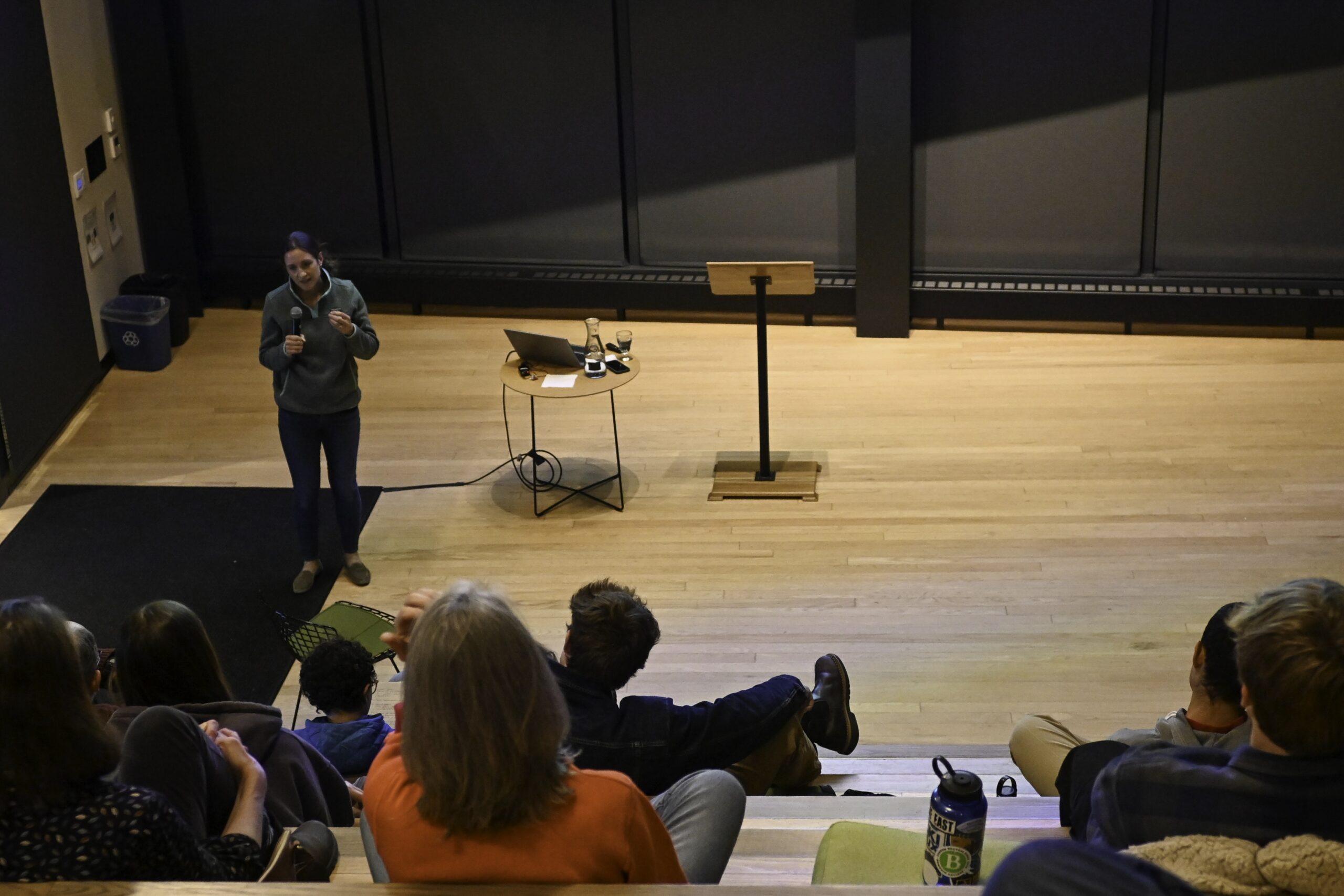Katie Auth ’08 brings global perspective to climate solutions
November 22, 2024
 Thetis Fourli
Thetis FourliStudents and faculty piled into Roux Lantern’s long benches on Monday evening to learn about a widely unknown element of the climate crisis: energy poverty. In a talk co-sponsored by the economics department and the environmental studies program, Bowdoin alumna Katie Auth ’08 shared her insights from 12 years of work in the clean energy sector and the U.S. government, offering a global perspective on the green energy transition and climate optimism.
Auth defined energy poverty as the vast disparity between access to power in wealthy countries and poor states in the global south, namely those located in sub-saharan Africa. She discussed the hardships faced by 700 million people living without power across the globe, using the concept of “time poverty” to describe how access to power is implicated in a larger cycle of inequality that goes beyond mere electricity.
“Time poverty means that if you don’t have an electricity connection in your house, you have to go out and find fuel. So you’re often walking for miles trying to find firewood,” Auth said. “Often, it’s women who are doing this work. If they’re out collecting fuel and they’re spending a large portion of their day doing that, it means they’re not in school, and they’re not earning an income.”
On an international level, Auth added, energy-poor countries are less likely to be able to compete in global markets and administer reliable healthcare. To illustrate the healthcare-related consequences of energy poverty, she showed a picture of a Newborn Intensive Care Unit (NICU) located in the Democratic Republic of Congo, which was running on an unreliable, diesel-fueled generator.
“There is no country in the world that is both rich and energy poor. And so you see the immensely close relationship between [wealth and energy],” Auth said. “If you’re trying to run a garment facility in Nigeria,… you’re paying almost twice as much just to ensure that you have reliable electricity. And if you think about what that means in terms of global competitiveness, there’s no way that your little factory in Nigeria can compete with someone who’s in Vietnam who has reliable power.”
Pivoting to a domestic context, Auth discussed the rise of an alternative form of energy poverty in the United States. As a result of climate change, she explained, more and more American households can be classified as energy poor, or having to spend more than six percent of their income on energy services.
“The part that is most interesting is that you’re seeing the fastest rates of change [of energy poverty] in the [American] South, because temperatures are rising and people need to use a lot more air conditioning. And as that occurs, they spend a greater portion of their income, and it’s a big hardship for a lot of people in this country,” Auth noted.
In the next part of her discussion, Auth used data-backed examples to illuminate the global inequality posed by energy poverty. Explaining a phenomenon known as the “Refrigerator Effect,” she showed the significant disparity in energy consumption between wealthy and poor nations.
“The orange bar on the right, that’s your family refrigerator. That single refrigerator consumes more electricity in a year than a person in any one of these [African] countries across all aspects of their life. I think that’s crazy,” Auth said.
Auth ended her talk on a positive note by sharing five reasons to be optimistic about efforts to combat climate change. These included global progress in the installment of clean energy and legislative benchmarks in the U.S., including the Inflation Reduction Act (IRA). Auth explained her belief that the progress made by the IRA will not stagnate under the next Trump administration.
“If you look at where the [IRA] investment is actually going, you realize how strong the impact is going to be in Republican-controlled states; 86 percent of the investment from the IRA is actually going into Republican-controlled congressional districts,” Auth said. “And so I think the staying power of these investments is not going to go away. And I think the politics are hopefully going to ensure that the core parts of the law stay in place.”
Carlos Ruiz ’26 attended Monday’s talk and appreciated Auth’s well-rounded expertise on energy consumption and climate crises.
“The speaker brought some very interesting perspectives from her work in the international space and … brought some perspective to where we are in the U.S. in terms of our energy and transition being a much different energy transition than being worked on in the rest of the world,” Ruiz said. “She made some really interesting points about why that is problematic, not just for their energy consumption, but also with the time deficits that she talked about.”

Comments
Before submitting a comment, please review our comment policy. Some key points from the policy: